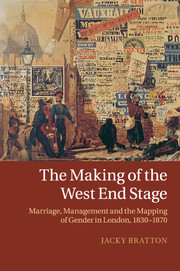 The Making of the West End Stage
The Making of the West End Stage Chapter 1 - Why the West End?
from Part I - Mapping
Published online by Cambridge University Press: 05 November 2011
Summary
London is the theatrical centre of Britain, time out of mind. When the 1843 Theatres Act was passed, there were three ancient patent houses in London and three new theatres with annual licences from the Lord Chamberlain's office, as well as a crowd – fluctuating between twenty-five and forty – of places which sometimes presented shows sufficiently conspicuously to be noticed by the press, or even to be prosecuted for exceeding their legal permission to play. Responding to the increasing size of the city, there had been a boom in building and making over buildings for theatrical purposes through the first third of the century, which continued strongly through the 1830s, so that by the time the act came into force there were many potential places where the mushrooming population of the metropolis might be entertained. But 1843 was clearly a moment, obvious at the time as well as by hindsight, when a new dispensation in theatrical provision might be expected. All commentators who could spare time to consider the developing culture of Victorian Britain were looking for something to begin, in which theatre would be part of the new self-consciousness and self-definition of the British. Nobody knew at the time that this was to be the West End.
John Pick, in his incisive dissection and condemnation of the ‘mismanagement and snobbery’ of the West End, argues that the 1840s saw an opportunity missed, or even suppressed, when an explosion of entertainment provision across the whole city, for the benefit of the many, was not followed through, and the huge auditoria that had already been thrown up for spectacle and music at cheap prices were ignored, prosecuted or simply written off as déclassé. Instead, he suggests, theatre was allowed to remain in the hands of a few whose vested interests concentrated new development in the ‘fashionable rectangle bounded by the Strand, Kingsway, Oxford Street and New Bond Street’ despite the fact that such a theatre district was not really convenient of access for the many, and led to ‘a highly ritualised theatre catering directly for the privileged’ which led in turn to a ‘near-monopoly of theatre practice’ ‘narrow in its social ambitions’ but ‘powerful in its creation of new managerial and artistic conventions to realise them’. Tracy Davis, looking more closely at the operations of the licenser in the 1840s, notes the wavering and often obviously prejudiced or randomly political decisions about who should be granted theatre licences even within this central district, and concludes that ‘what the Lord Chamberlain's office was having to go through in these years was not unlike the birth pangs of free market capitalism’, especially when, from 1850, ‘the picture was about to be complicated further by the emergence of music halls’ and the consequent resurgence of attempts at protectionism by the theatre proprietors.
Information
- Type
- Chapter
- Information
- The Making of the West End StageMarriage, Management and the Mapping of Gender in London, 1830–1870, pp. 17 - 45Publisher: Cambridge University PressPrint publication year: 2011